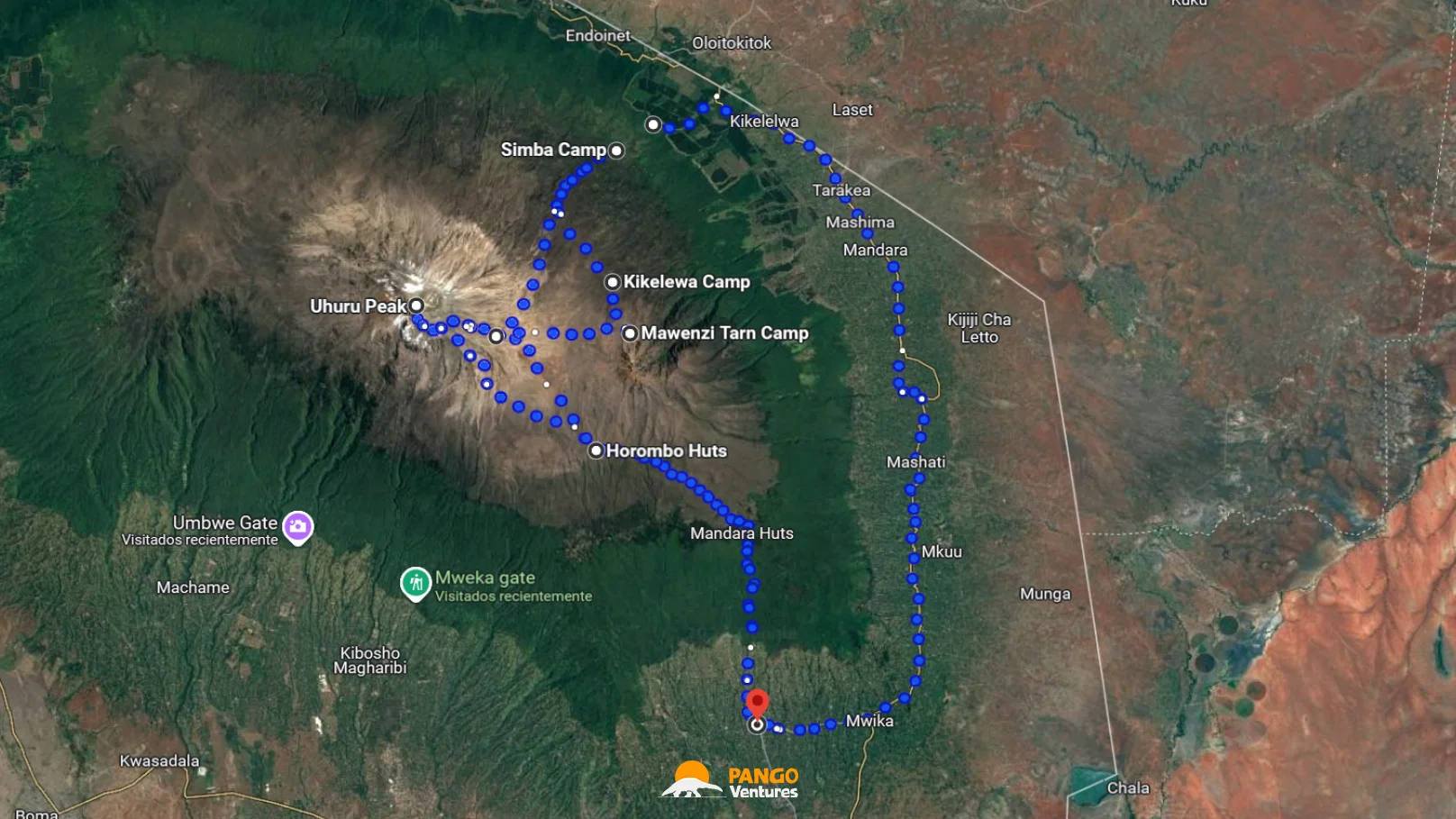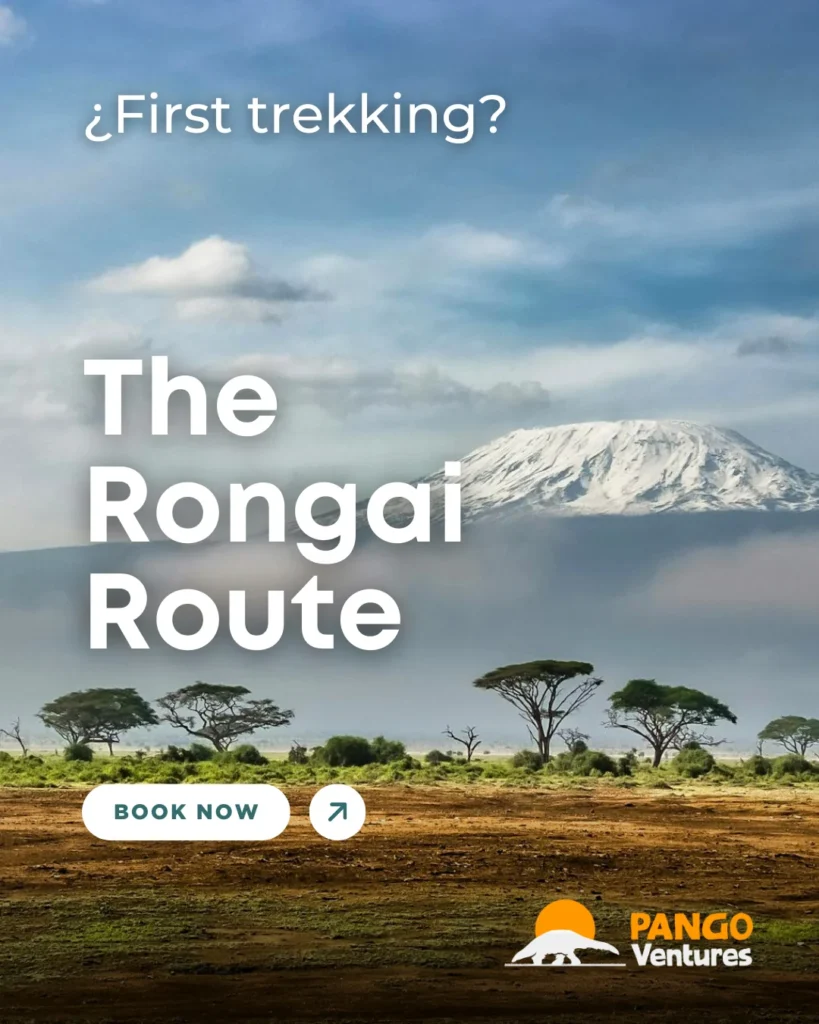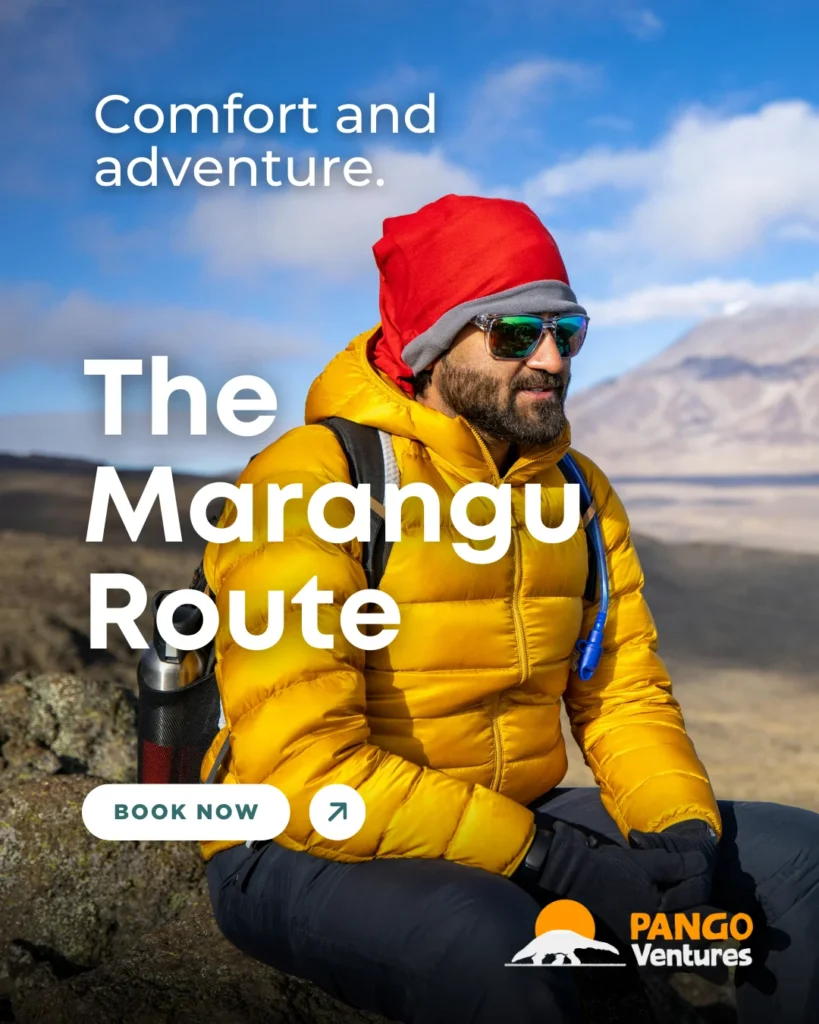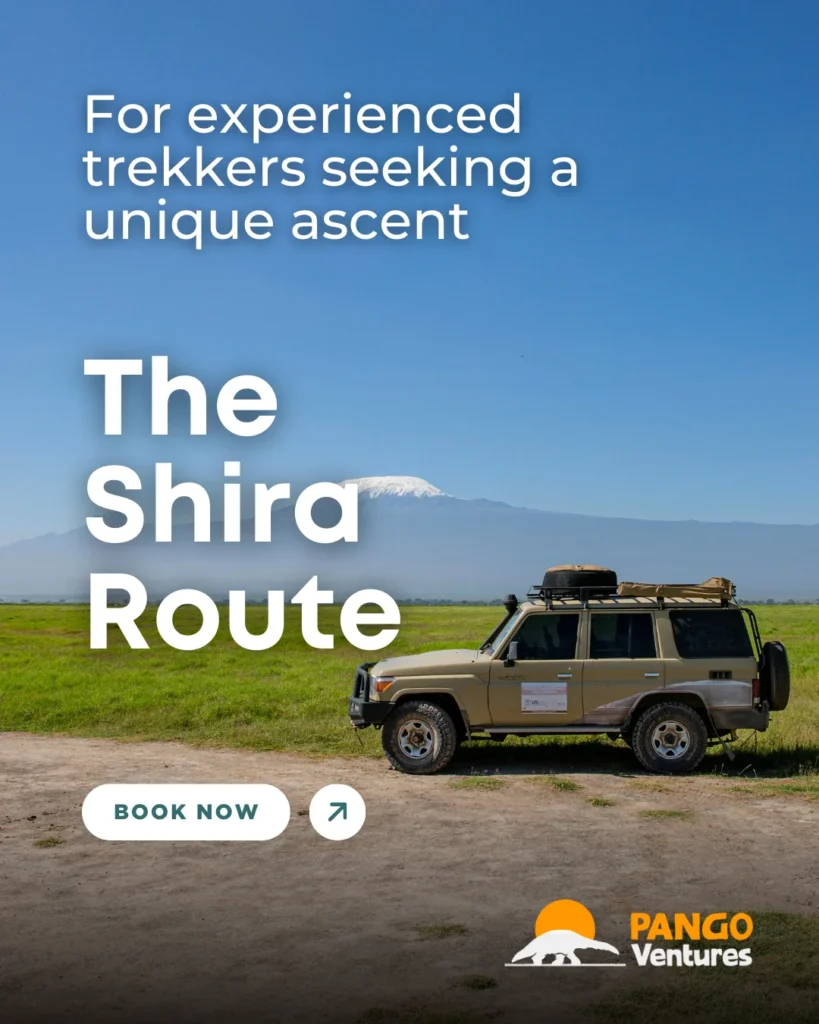The Rongai Route on Kilimanjaro (6 days)
Where you'll be

Set out on the 6-day Rongai Route, a scenic and less crowded path to Kilimanjaro’s summit that offers a unique perspective from the mountain’s northern side.
Your journey begins at Rongai Gate, where you’ll pass through farmland and forests teeming with wildlife, including monkeys and antelopes. As you ascend, you’ll experience stunning views of the Kenyan plains, gradually leaving behind the forests and entering the vast moorlands. The adventure intensifies with dramatic landscapes and your climb to Mawenzi Tarn, sitting beneath the impressive Mawenzi spires.
On summit day, you’ll start at midnight, pushing through the night to reach Uhuru Peak (5,895m), the highest point in Africa. After an unforgettable moment at the top, you’ll descend through varied terrains, passing back through lush rainforests before concluding at Marangu Gate, where you’ll collect your summit certificate.
The Rongai Route offers adventurers a quieter, scenic alternative to the busier trails, with a balance of challenge, beauty, and solitude that makes the summit experience truly unique.
6 days | ~6 km (~4 miles) | Once-in-a-lifetime experience
Cancellation flexibility
What you'll do
Day 1: Rongai Gate to Simba Camp
- Elevation: 2,000m (6,560ft) to 2,635m (8,645ft)
- Distance: ~8 km (~5 miles)
- Hiking Time: 4-5 hours
- The trek begins at the Rongai Gate on the northern side of the mountain near the Kenyan border. You’ll hike through farmland and forests with chances to spot wildlife like antelopes and monkeys. The first night is spent at Simba Camp.
Day 2: Simba Camp to Second Cave
- Elevation: 2,635m (8,645ft) to 3,450m (11,320ft)
- Distance: ~7 km (~4.3 miles)
- Hiking Time: 4-5 hours
- The hike continues through moorland with open views of the Kenyan plains. The ascent is gradual, allowing your body to adjust to the altitude. You’ll stop at Second Cave for the night, with views of Kibo Peak in the distance.
Day 3: Second Cave to Kikelewa Camp
- Elevation: 3,450m (11,320ft) to 3,600m (11,810ft)
- Distance: ~9 km (~5.5 miles)
- Hiking Time: 5-6 hours
- The trail gets steeper as you ascend through the moorland and head toward Kikelewa Camp. This section is more challenging, but the landscape becomes increasingly dramatic, with views of the peaks becoming more prominent. You’ll spend the night at Kikelewa Camp near some picturesque giant groundsels.
Day 4: Kikelewa Camp to Mawenzi Tarn
- Elevation: 3,600m (11,810ft) to 4,330m (14,210ft)
- Distance: ~6 km (~3.7 miles)
- Hiking Time: 3-4 hours
- The hike today is shorter but steeper, as you climb up to Mawenzi Tarn, situated in a dramatic cirque beneath the towering spires of Mawenzi Peak. This is a great day for acclimatization, and you’ll spend the afternoon exploring the area and resting.
Day 5: Mawenzi Tarn to Kibo Hut
- Elevation: 4,330m (14,210ft) to 4,703m (15,430ft)
- Distance: ~8 km (~5 miles)
- Hiking Time: 5-6 hours
- You’ll cross the lunar desert of the saddle between Mawenzi and Kibo peaks. The landscape is barren, and you’ll feel the effects of the altitude. You’ll reach Kibo Hut in the afternoon, where you’ll rest and prepare for the final ascent to the summit.
Day 6: Kibo Hut to Summit (Uhuru Peak) and descent to Horombo Hut
- Elevation: 4,703m (15,430ft) to 5,895m (19,341ft) to 3,720m (12,200ft)
- Distance: ~19 km (~12 miles)
- Hiking Time: 10-14 hours (Summit: 6-8 hours, Descent: 4-6 hours)
- The summit attempt starts at midnight. You’ll trek up the steep scree slope to reach Gilman’s Point on the crater rim, then continue to Uhuru Peak, the highest point in Africa. After celebrating your achievement, you’ll descend back to Kibo Hut for a short rest before heading down to Horombo Hut.
Descent Day: Horombo Hut to Marangu Gate
- Elevation: 3,720m (12,200ft) to 1,879m (6,200ft)
- Distance: ~20 km (~12.5 miles)
- Hiking Time: 6-7 hours
- On the final day, you’ll descend through the moorland and rainforest zones to Marangu Gate. You’ll sign out and receive your summit certificate before being transported back to your hotel.
The Rongai Route is known for being less crowded and offering a unique perspective of the mountain, with scenic views of Kenya along the way.
All of our guides are experts and locals
Things to know
Less Crowded: The Rongai Route is known for being quieter and less trafficked compared to other routes, offering a more peaceful hiking experience.
Wildlife Spotting: The early part of the trek, near Rongai Gate, passes through farmland and forests where you may encounter wildlife like monkeys, antelopes, and various bird species.
Gradual Ascent: The Rongai Route offers a more gradual ascent, which can be helpful for acclimatization. However, altitude sickness is still a concern, so it’s important to go slow and stay hydrated.
Diverse Landscapes: You’ll experience a variety of terrains, from lush rainforests to barren lunar landscapes and dramatic moorlands. Each day offers a different view of Kilimanjaro’s diverse ecosystems.
Summit Night: The final push to Uhuru Peak begins around midnight, making it a challenging ascent in the dark, with cold temperatures and high altitude. Be prepared for a tough but rewarding climb.
Dual Descent: The descent takes you along the Marangu Route, providing a different view and environment as you head down through the lush rainforest.
Weather: The weather on Kilimanjaro can be unpredictable. Pack for both hot daytime temperatures and freezing conditions at night, especially on the summit attempt.
Physical Preparation: The Rongai Route, while considered easier than some, still requires a good level of physical fitness due to long hiking hours and altitude.
Accommodations: You will camp each night along the trail, so expect to sleep in tents. Be ready for rustic conditions, but with stunning views under the stars.
Summit Certificate: Upon completing your trek, you’ll receive a summit certificate at Marangu Gate, celebrating your achievement of reaching the roof of Africa!



